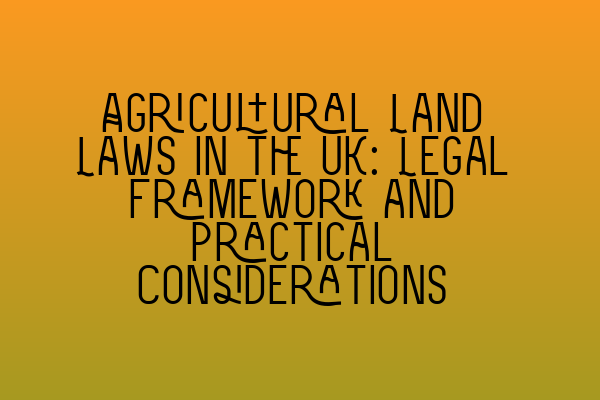Agricultural Land Laws in the UK: Legal Framework and Practical Considerations
As a solicitor at SQE Property Law & Land Law, I often come across clients who require expert advice on agricultural land laws in the UK. These laws play a crucial role in safeguarding the rights of farmers, ensuring the sustainability of agricultural activities, and protecting the environment.
In this blog post, we will explore the legal framework surrounding agricultural land laws in the UK, as well as provide practical considerations for farmers and landowners. Whether you are a farmer looking to expand your operations or a landowner interested in leasing your property to agricultural tenants, this guide will provide you with the essential information you need to navigate the complex landscape of agricultural land laws.
The Legal Framework: Understanding Agricultural Tenancies
Agricultural tenancies are a key concept to understand when it comes to agricultural land laws in the UK. The legal framework for agricultural tenancies is primarily governed by the Agricultural Holdings Act 1986 and the Agricultural Tenancies Act 1995. These Acts provide a structure for the relationship between agricultural landlords and tenants, ensuring that both parties are protected and have certain rights and responsibilities.
There are two main types of agricultural tenancies: Farm Business Tenancies (FBTs) and Agricultural Holdings Act (AHA) tenancies. FBTs were introduced by the Agricultural Tenancies Act 1995 as a more flexible alternative to AHA tenancies. FBTs allow for greater freedom in terms of rent, length of tenancy, and other terms, making them the preferred choice for many modern agricultural businesses.
Practical Considerations: Leasing Agricultural Land
If you are a landowner looking to lease your property for agricultural purposes, there are several practical considerations to keep in mind. Firstly, it is important to clearly define the terms and conditions of the lease agreement. This includes specifying the length of the tenancy, rent payments, repair responsibilities, and any restrictions or permissions regarding land use.
Furthermore, conducting thorough background checks on potential tenants is crucial to ensure that they have the necessary skills and resources to effectively manage the land. By reviewing their farming experience, financial stability, and references from previous landlords, you can mitigate the risk of entering into an unfavorable agreement.
Another important consideration is complying with environmental regulations. Agriculture can have a significant impact on the environment, and as a landowner, it is your responsibility to ensure that farming practices on your land adhere to relevant laws and regulations. This includes managing waste, protecting water sources, and implementing sustainable farming methods.
Consulting with an experienced solicitor specializing in agricultural land laws is highly recommended when drafting lease agreements and ensuring compliance with regulations. They can provide valuable guidance and support throughout the process, helping you navigate potential legal pitfalls and safeguard your interests.
The Importance of Staying Informed
Agricultural land laws in the UK are subject to continuous changes and updates. Staying informed about the latest developments is essential for both farmers and landowners. One way to stay up-to-date is by regularly consulting reputable legal resources and publications that specialize in agricultural land laws.
Additionally, SQE Property Law & Land Law offers comprehensive courses and preparation materials for the SRA’s Solicitors Qualifying Examination (SQE). These courses cover a wide range of legal topics, including agricultural land laws, and provide invaluable insights and practice opportunities for aspiring solicitors.
Conclusion
As a solicitor, I understand the complexities and challenges involved in navigating agricultural land laws in the UK. By familiarizing yourself with the legal framework, considering practical aspects of leasing agricultural land, and staying informed about updates and developments, you can protect your rights and interests as a farmer or landowner.
If you have any further questions or need expert legal advice on agricultural land laws, do not hesitate to contact SQE Property Law & Land Law. Our team of experienced solicitors is here to provide you with the guidance and support you need. Remember, knowledge is power, and staying informed is fundamental to succeed in the ever-evolving landscape of agricultural land laws in the UK.
Related Articles:
– SQE 1 Practice Exam Questions
– SQE 1 Practice Mocks FLK1 FLK2
– SQE 2 Preparation Courses
– SQE 1 Preparation Courses
– SRA SQE Exam Dates
